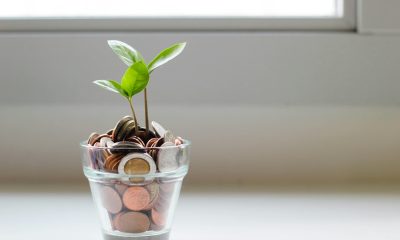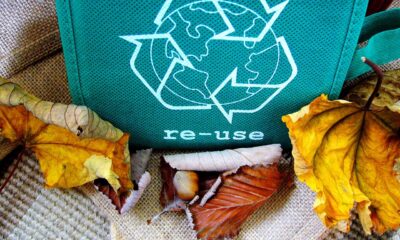Featured
How can SMEs tackle the crisis by integrating ESG criteria into their strategies
In the inaugural event of the SRI Week, it emerges that Italian companies are aware of the importance of sustainability but not used to adopting it in strategic choices. In addition, Italy is behind on “green” public finance. Only one in three companies has taken ESG products into consideration and less than 30% have adopted tools such as sustainability ratings or have drawn up a non-financial statement.

Sustainability is an obligatory path that imposes a cultural revolution not only among companies and SMEs, in particular, but also among financial players and institutions. With the awareness that this is not only an “ethical” choice but also a path that allows for efficiency and growth, for companies, for the financial ecosystem, and for the country.
That is the main message that emerged in the first webinar that inaugurated the ninth edition of SRI Week, in which a warning signal was launched: Italy is among the top ten countries in the world for green bond emissions, but is still lagging behind in terms of public finance, according to the Secretary-General of the Forum for Sustainable Finance, Francesco Bicciato.
“On a global level, the estimates for 2020 are of a green bond issuance of $350 billion. The Italian market is in the top ten for green bond issuers, but it is not in the top ten for sovereign green bonds,” said Bicciato, who pointed out a certain misalignment between public finance actions and market progress. “It would be important for public sector regulation and direct involvement in the issuance of these instruments, especially when the famous resources of the Next-generation Eu that, with the SRI market, can be multiplied.”
Read more details about the ninth edition of Sri Week in Italy and find the latest financial headlines with the Born2Invest mobile app.
How could Italy increase its GDP
Bicciato noted that by spending 80% of European resources in the decarbonization of the economy, “Italy could achieve a 30% increase in GDP and an increase in the employment rate of 11 points by 2030,” according to the data of the Ossigeno per la crescita report by Ref. The Secretary-General reiterated that “sustainable finance is worthwhile,” because it helps to prevent risks. Proof of this is the fact that during the crisis, the companies that had pushed more on sustainability proved to be more resilient.
The event was an opportunity to present the research “Italian SMEs and sustainability” conducted by the Forum for Sustainable Finance in collaboration with BVA Doxa, which showed that more than 80% of Italian SMEs consider sustainability as an important element in strategic and investment choices and one company out of three believes that integrating sustainability among the criteria that guide strategic choices will help to exit more quickly from the crisis triggered by the pandemic (since it reaches 39% among companies with at least 50 employees).
The majority of SMEs also consider sustainability an important element in financial and credit activities, so much so that 80% believe that financial operators should place the ESG indicators alongside the traditional ones to adequately assess creditworthiness; for 33% sustainable projects should benefit from better financing conditions.
However, these positive assessments are opposed to a lack of effective integration of ESG criteria into company strategies:
Only one in three companies has taken ESG products into consideration and less than 30% have adopted tools such as sustainability ratings or have drawn up a non-financial statement. Many companies are held back by the idea that combining sustainability has higher costs (52% of the sample) or imposes bureaucratic difficulties, for example, to obtain and maintain certifications (50%). “Many companies do not inform themselves directly, but it turns out that even financial partners often do not promote specific products to finance sustainable projects,” explained Arianna Lovera, senior program officer of the Forum for Sustainable Finance.
Not only that: at present, if environmental sustainability is a concept well metabolized by companies, there is still little awareness on the factors “S” and “G”: “it is necessary to improve the integration and communication of social and governance components,” noted Simone Pizzoglio, partner of Bva Doxa, commenting that even on sustainability often the push comes from the individual initiative of SMEs, and therefore the financial and associative world has a key role to start the dialogue on these issues.
“It is necessary to enhance social capital,” said Alfonso Del Giudice, Full Professor of Corporate Finance at the Catholic University of the Sacred Heart. “On the environmental side, considerations in terms of the materiality of the impact are easier than the social one. But the pandemic has shown that the most resilient companies are those that have taken the greatest care of the social part, in relations with employees, with the supply chain, etc.”, added Del Giudice. The teacher hopes for a “cultural transition”, to make it clear that sustainability is not an additional element or cost but a business objective, “moreover, able to improve productivity.”
“The bank can be a partner for the growth of SMEs, particularly in terms of sustainability,” commented Anna Maria Roscio, executive director Sales&Marketing Imprese of Intesa Sanpaolo, noting that institutions should include sustainability in the criteria for assessing creditworthiness. To this end, Intesa has introduced an assessment questionnaire that helps to integrate intangible aspects – including those related to sustainability aspects – into the rating assessment process. In addition, it “has developed a ‘sustainability loan’, which provides that the company and the bank share a sustainability path measured by certain Kpi, at the achievement of which they improve the conditions of the loan.”
The problem, however, is that most banks think the opposite, noted Andrea Benassi, head of Public Affairs & Sustainability at Iccrea Banca. Since sustainability choices, for example on the environment, are often translated into costs, “often the bank may agree to finance more non-green companies, and this is a paradox. The problem is also compliance costs. “Declaring one’s sustainability may have a cost higher than the potential benefit obtained on the financial conditions offered by the bank,” Benassi said.
“We need to get the message across that those related to sustainability are not costs, but investments,” said the spokesman of Asvis, Enrico Giovannini. “The limitation of non-financial reporting only to large companies, and not even to all of them, was a very serious mistake. It must be corrected with the next budget law,” said Giovannini, proposing the obligation of Dnf for all companies over 250 employees.
__
(Featured image by stevpb via Pixabay)
DISCLAIMER: This article was written by a third party contributor and does not reflect the opinion of Born2Invest, its management, staff or its associates. Please review our disclaimer for more information.
This article may include forward-looking statements. These forward-looking statements generally are identified by the words “believe,” “project,” “estimate,” “become,” “plan,” “will,” and similar expressions. These forward-looking statements involve known and unknown risks as well as uncertainties, including those discussed in the following cautionary statements and elsewhere in this article and on this site. Although the Company may believe that its expectations are based on reasonable assumptions, the actual results that the Company may achieve may differ materially from any forward-looking statements, which reflect the opinions of the management of the Company only as of the date hereof. Additionally, please make sure to read these important disclosures.
First published in FocusRisparmio, a third-party contributor translated and adapted the article from the original. In case of discrepancy, the original will prevail.
Although we made reasonable efforts to provide accurate translations, some parts may be incorrect. Born2Invest assumes no responsibility for errors, omissions or ambiguities in the translations provided on this website. Any person or entity relying on translated content does so at their own risk. Born2Invest is not responsible for losses caused by such reliance on the accuracy or reliability of translated information. If you wish to report an error or inaccuracy in the translation, we encourage you to contact us.

-

 Crowdfunding1 week ago
Crowdfunding1 week agoDolci Palmisano Issues Its First Minibond of the F&P “Rolling Short term” Program
-

 Fintech5 days ago
Fintech5 days agoRipple Targets Banking License to Boost RLUSD Stablecoin Amid U.S. Regulatory Shift
-

 Crypto2 weeks ago
Crypto2 weeks agoCoinbase Surges: Bernstein Targets $510 as COIN Hits Highest Price Since IPO
-

 Biotech20 hours ago
Biotech20 hours agoBiotech Booster: €196.4M Fund to Accelerate Dutch Innovation
























